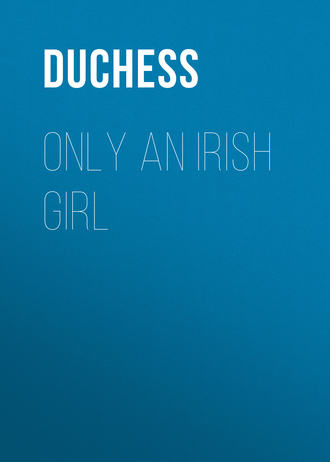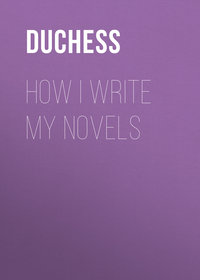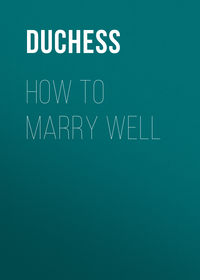 полная версия
полная версияOnly an Irish Girl
But Launce scoffs at any such idea.
"It is some blackguard," he says scornfully, "got up on purpose to scare folks! He was within an ace of getting his skull broken for his pains."
Is it their overwrought fancy, or does a low mocking laugh float back to them?
Honor shivers.
"Let us get into the house," she says. "I feel as if I could not breathe out here; and don't let us talk any more about it, please!"
But Launce cannot hold his tongue; he does nothing but scoff at their credulity, and when they reach the house the first thing he does is to go straight to the dining-room and tell the whole story to his father.
The old man looks grave as he listens; it even seems to Honor if a little of the ruddy color dies out of his face.
"Best let these things alone, my boy," he says at last.
In his own young days such things as warnings were neither scoffed at nor disbelieved in.
"Let us keep our powder and shot for men of bone and muscle like ourselves, Launce, and not waste them on shadows."
If he had said, "Let us ask the old abbot up to supper, and treat him to a jorum of whiskey-punch," Launce could not have looked more surprised.
"Well," he says in a tone if disgust, "I did think you had more sense, father, than to believe in a fellow walking about some hundred and fifty years after his own funeral."
The old man smiles, but he says no more; and Honor feels that the appearance of this phantom has cast a gloom over the house that was scarcely needed.
"And Launce ought to have had more sense than to talk to the pater about it," she says to herself, as she watches the squire's anxious face. "He ought to have remembered that the last time that horrid old abbot was seen about poor grandpapa was shot; and of course everybody said the abbot had come to warn him."
CHAPTER V
After that night no more is seen or heard of the old abbot.
"Wait till the moonlight nights are past, and he'll turn up again,"
Launce says in his scoffing way.
But the nights are dark enough now – it is an almost sunless September, and yet they see nothing of the figure. To Honor has come an additional trouble – the engagement between her brother and Belle Delorme is broken off. Poor little Belle goes about like a ghost; her miserable eyes, which go so far to contradict the smile on her lips, fairly haunt Honor.
"If Launce ever loved her he could not bear to see her looking like that!" the girl says, in her angry surprise that he, her favorite brother, should prove so cruel. But Launce just now has eyes for no one but Kate Dundas.
The widow is more fascinating than ever. Two gentlemen are staying on a visit with her, one from London and one – who is eyed with suspicious disfavor by her poorer neighbors – from Dublin Castle itself.
There are dinners or card-parties almost every night, and, to use a vulgar expression, Launce Blake is never off the doorstep.
People are beginning to say that he will marry her and snap his fingers at the old squire, who, for some reason best known to himself, is no admirer of the brilliant widow.
"It's the greatest pity in the world that you couldn't keep your temper!" Honor says reproachfully to her friend, when she comes to tell her that the engagement is at an end. "I always told you Launce would not stand being found fault with; sure a child could lead him."
"Yes," Belle answers bitterly, "such a child as Kate Dundas! I knew from the first how it would end, dear. The woman means to marry him, and she will do it."
Honor sighs. It is dreadful to think of handsome Launce, with his brilliant prospects, being sacrificed to this woman, ten years older than he is, and the widow of a very "shady" major of dragoons.
"It is not as if he loved her!" says Belle, almost with a sob. "He does not love her. It's all a 'bewitchment,' as old Aileen would say; and, when she has got him, he'll be miserable."
"But we mustn't let her get him, dear; we must stop it, you and I."
"Then I'm sure I don't see how we are to manage it," Belle sighs.
Neither does Honor, but she is not going to admit that.
Twilight is setting in when Belle gets up to go home.
"Oh, dear, why have I stayed so long?" she says, with a little nervous sigh. "It will be almost dark before I get out on the road."
"And what about me here alone all the day – and I shall be alone for hours yet! The pater has gone down to the Low Acres, and the boys are shooting Colonel Frenche's covers. They can't be home till dark."
"I don't know how you live, and that's the truth, Honor. We often say so at home. I should go mad, I know I should."
"Oh, I don't feel like that in the least; but sometimes I am lonely – very!"
And in truth it is a very wistful face that watches pretty Belle hurrying down the avenue. Honor has grown very thin and pale of late, and to-night, in her white gown, she looks thinner and paler than ever. She is feeling the need of a friend sorely. Often Brian Beresford's words come back – "If ever you should want me, either as friend or lover, send for me, and I will come."
She wants him now – his friendship, she feels, would be a stay and shield for her – but she never dreams of taking him at his word, and asking him to come back to Donaghmore.
She is feeling unusually depressed as she looks out at the sky, which is slowly changing from pink and opal to a sullen gray.
A morbid dread has been upon her all the day, and the sighing of the wind in the pine-trees – for a storm is rising over a neighboring mountain – does not tend to make her more cheerful. She stands a little while watching the grass bending before the breeze and the dead leaves swirling and eddying round on the smooth-cropped lawn.
"The rain will be coming down before Aileen could get half-way home," she says to herself, and straightway goes down to the kitchen to forbid her old nurse's departure.
The old woman is sitting before the fire, her head slightly turned, as if she were listening.
At the sound of Honor's step on the tiled floor she springs upright.
"How ye startled me, honey! Shure in that soft white gown ye might pass for one of the blessed saints themselves. I took ye for a spirit – I did an' troth, Miss Honor, at the first glance."
She seems unusually tired and excited, but she will not hear of staying for the night at Donaghmore.
"Is it a tough old woman like me to be afeard of a sough of wind or a few drops of rain? No, no, my lamb! I'll go home this night, the saints being willin'!"
It is almost dark in the front hall as the girl passes through; only a faint gray light comes in at the open door.
In the drawing-room the windows stand open just as she left them; and, wondering a little at the old butler's carelessness, she proceeds to fasten them herself.
As she does so she sees a man cross the drive quickly from the servants' quarters at the back of the house. He is followed after a brief space of time by another man, and both disappear in the direction of the gates.
"I did not know they had visitors in the kitchen to-night," she says to herself, and straightway forgets all about it.
More than an hour passes before she hears her father's step in the hall.
"Where are the boys?" he says, as she comes out of the drawing-room to speak to him.
"They have not come from the colonel's yet. They said they might be late."
"A man has been shot on Keif Moss – shot dead, and by mistake for some one else, they tell me."
She reads the fear that is blanching the strong man's face, and making his voice sound low and husky in the empty hall.
"Not Launce, father! Don't tell me that it is Launce!"
"Heaven only knows! It was some one who was coming from that hateful Rose Mount; and, let Launce go east or west, he ends there before the day is out."
She knows it is too true; and suddenly her composure gives way, her strength with it, and, throwing her arms about her father's neck, she bursts into tears.
Very drearily the hours pass to the old man and the girl waiting and listening in the large lonely house.
It is twelve o'clock before Horace comes home. He has seen nothing of his brother since they met for lunch at the colonel's. He would ride off then and there to make inquiries if his father would let him; but the squire will not hear of such a thing. He sends them to their own rooms, and sees to the fastening of doors and windows – a thing Honor has never known him to do in all his life before – and then he sits down in the large empty dining-room – the scene of many a jovial feast – to wait for the morning light, and the news that must come with it!
But this is fated to be a night long remembered at Donaghmore. All her life long Honor will look back upon it with dread – will remember the deep anxiety, amounting to despair, that makes its black hours as they creep by seem like days in ordinary life.
It is a moonless night, and the wind, which has risen to a gale, fills the air with noises – the rattling of loosely-fastened shutters, the sough of the pine trees behind the house, the thousand-and-one eerie sounds that a high wind and night bring into empty rooms and corridors.
It is useless to go to bed – she could not sleep. Even if there was no storm, the horrible doubt – which grows less a doubt every hour – that the man who has met his death on Keif Moss is her brother Launce would be enough to banish sleep from her eyes.
And then Aileen's dream of the grave cut deep in the moss, and hidden from sight by green branches – it all comes back vividly now, and adds to the girl's torture. She has no longer the strength to scoff at these things. And, if that was a warning of the death that was lying in wait for her darling, then the other dream of the grave out there on the lawn, in view of their own windows, might not that come true?
As the thought occurs to her, she draws back the curtains and looks out. It is too dark to see anything, and she is turning away, when the glimmer of a light in the direction of the old ruins makes her start and pause.
"What can it be?" she asks herself.
It is glowing more brightly now, a fixed point that grows more luminous every instant, till suddenly – as she stands watching it – it goes out.
The gale is at its height now, making doors and windows rattle, tearing at the branches of the stout old trees, rioting and shrieking over the empty fields; but it is not the wind that Honor hears as she stands there breathless, one hand to her heart, the other holding by the bed-rail to steady her from falling. It is the sound of an opening door, of softly-tramping feet, of harsh voices speaking in a muffled key, that makes them ten times more terrible and threatening.
At the same instant Horace – his room is next to hers – rushes past the door and down the stairs in headlong haste.
Then rise the shrill screams of women, and over all her father's voice, resolute and undaunted.
"Not from this house, my men." The words come up clearly to her as she stands at the top of the stairs, faint and dizzy with fright. "Not while a drop of blood runs in our veins. You may kill me – it is an easy thing to shoot an old man – " But here his words are drowned in a burst of yells and howlings terrible to listen to.
The next moment Honor is down in the hall, and has pushed her way past her brother and the terrified servants to where her father stands, his back to the dining-room, his face turned toward the little group of men who, with black masks over their faces, have forced their way into the hall.
It is a terrible scene – the girl will never forget it. These uncouth menacing figures, the frightened faces of the women gathered about the staircase, her young brother, as pale as any woman there, but cool and calm. But the one figure distinct from all the rest is that of her father, drawn to his full height, his resolute face turned full upon his cowardly assailants. He looks quite ten years younger than he did when she left him a few hours before, and there is a stern look on his face that frightens her. She has heard of the "fighting Blakes," and she begins to understand that even yet the old spirit has not died out in the race.
He sees her, but he makes no effort to send her away. In this supreme hour of trial the love of his heart recognizes her right to be with him even if it should be the bitter end.
"Go back, Miss Honor!" some one shouts. "Shure, we would not hurt a hair of your head!"
But the girl smiles coldly. She has no fear for herself; her one care, her one dread is for the safety of those others, who are dearer to her a thousand-fold than her own safety.
The men talk fast and furiously, but she hardly hears their words. She is waiting for what must come after, when all their threats have failed, as she knows so well they will fail.
They demand arms – with which they know the house to be well supplied. "Give them arms, and they will go in peace, for the present, squire," one man adds, with menacing emphasis.
For answer Robert Blake raises his right arm, and they see the muzzle of a revolver; and now a louder and more angry cry comes from the crowd.
"You know me, James Phelan," the squire says calmly, addressing an old tenant whose voice he has recognized; "tell these men that I am a dead shot, and I will fire if they come a yard nearer."
For an instant the crowd sways back, then it rallies. Those behind push the front rows mercilessly forward. The men are thoroughly excited now – there are more of them than at first appeared – and Honor feels that the next few moments will decide her fate and that of those dear to her.
Suddenly the great hall lamp falls to the floor with a crash, and the whole place is in profound darkness. For an instant the men, pressing toward their prey, pause, afraid, it may be, of a stray bullet striking them in the obscurity.
Then a loud shout is raised, and the hall, the stairs, the corridors are filled with a struggling, panting, furious mob.
Honor feels herself lifted out of the crowd, and let down inside the library, close to the door.
"Don't move for your life, and don't speak!" a voice says softly, close to her cheek, and then she is alone; and, save for the lightning that illumines the room almost every moment, she is in darkness.
Outside there are loud hoarse cries, heavy blows, and trampling feet, the indescribable horror and confusion of a fierce fight fought with blind rage on both sides.
It cannot be that her father and Horace – for on the servants she does not count at all – are keeping all these men at bay so long!
The suspense becomes torture. She feels that at any risk she must know how things are going, and, cautiously opening the door, she looks out.
The hall is full of police; most of the attacking party have been disarmed – a few have escaped, but she does not know that; three men, however, are making a pretty tough fight for it still. But even as Honor stands and looks on, powerless in her dismay, it is over; the men are struck down and secured.
"This is no sight for you, Honor," a man's voice says suddenly, and, looking up, she sees Brian Beresford before her, with an ugly cut on the temple, from which the blood is flowing freely.
"You!" she gasps, holding her hands out to him with a gesture infinitely touching in one so cold and proud as Honor. "Oh, Brian, I have been wanting you so! I – I thought you would never come back!"
"You see you were mistaken," he says coolly. How the man's pulse are throbbing, how the welcome in her glad sweet eyes has thrilled him, no one looking at him could divine. "I said you were not so unprotected as you imagined," he adds, looking round with a grim smile. "We got here in time to foil the rascals – thanks to Aileen!"
"Why, what had Aileen to do with it? She went home hours ago."
"No, she did not. She crossed the mountain to Drum – a stiff climb for a woman of her years – and gave us notice that the house was to be attacked some time to-night, and off we came."
"Gave you notice?" the girl repeats. She looks dazed and faint, as well she may – a hollow-eyed, white-faced wraith of a girl, in her creased white gown.
The captured men are filing out now in twos and threes, closely guarded. Suddenly Honor starts forward, she has caught sight of a face that, disfigured by blows as it is, she would know among a thousand, and her heart seems to cease beating with the shock.
The tall man marching past between two policemen looks at her for an instant, and then turns his head aside. It is the one thing too much for Honor. With a heart-broken cry that has a thrill of horror in it she falls forward at her cousin's feet.
"Confound the fellow!" he says to himself, as he lifts her gently in his arms, as if she had been a child. "If he had not held out, like the fool he is, she need never have known a word about it."
CHAPTER VI
Kate Dundas's most bitter enemies cannot deny that she is a beautiful woman. Dangerous she may be – a modern Circe, many of whose admirers find their way to Kilmainham, but, above and before everything else, the woman is beautiful. But it is not her face nor her figure, lithe and lissom for all its ripe maturity, that so holds men's hearts in thrall. There is a charm about her, a curious magnetic power that is even more dangerous than her beauty.
"I would not care to see much of your Mrs. Dundas," an old squire once said, talking of her. "I never knew but one woman who had the same coaxing, fooling ways with her, and, begorra, sir, she was a demon in petticoats!"
But that was only the opinion of a blunt old farmer; Launce Blake knows her a great deal better, or thinks he does. In his own way he is almost as handsome as she is; a tall fair man, with eyes so dark a gray that they look black under their thick lashes and a smile as sweet as a woman's. But, as he sits in Mrs. Dundas's pretty room to-night, he is not smiling – he has come here from Colonel Frenche's, as his father guessed he would – he is looking very stern indeed, and "altogether unmanageable," as Kate Dundas says to herself. It is not the first time by many that she has seen him in this mood. Launce is not one of her humble adorers, and perhaps she likes him all the better on that account.
"I am sure I don't know why you should be so angry," she is saying, in her pretty soft voice, which has just a touch of the Devonshire accent in it. "The man is nothing to me; but since he brought a letter from the poor major's old friend, Major Cregan, I had to be civil to him. I couldn't – could I, now" – coaxingly – "send him back again?"
Launce listens gravely; it is quite a long speech for her to make – as a rule, her eyes, her slow sweet smiles, speak for her.
"That sounds very well – and it may be true, as far as it goes – but it is not all the truth."
"Oh, Launce, how unkind you are!" She is lying back in her chair, the lamplight falling upon her bare arms, her round white throat, and the diamond cross that sparkles on her bosom.
Her dress of some soft yellow stuff that shines like silk and drapes like velvet. She wears no flowers or ornaments of any kind, except the cross on her breast and some old-fashioned gold pins in her hair. Launce Blake, as he looks at her, feels the glamour of her beauty stealing over him like a spell.
His heart is beating furiously; his jealousy and distrust are waning fast before the passion of his love that is grown to be a part of his life.
"Is it any wonder that I am racked with fear? You are so beautiful, any man must love you! And this Hunter – who is he, that he should take his place in the house more like the master of it than a mere guest? And what right has he to keep every one away from you?"
"Dear" – she laughs softly; she has such an exquisite laugh – liquid, entrancing – "the man is ridiculous, I grant you. But then – so many men are ridiculous!"
Is she laughing at him? The eyes raised to his have just a touch of mockery in their lustrous depths, or he fancies they have. He is never quite sure of her – this woman who holds him by so strong a tie. There are times when he is driven half frantic by her "humor," just as there are times when he thinks himself the happiest man on earth because she loves him.
"We are all fools where a woman is concerned!" he says bluntly, and walks to one of the windows, setting it wide open, and letting the wind rush in with a shriek that makes Mrs. Dundas start in her chair.
"Oh, what a terrible night!" she says shivering. "I do not envy you your ride over the bog, if you take that road."
"Of course I shall take it, as usual! Why not?"
She is looking at him, a curious anxiety in her drooping eyes.
"But Launce, is it safe as things are now?"
"Safe or not, I choose to take it," he says coldly.
"But Mr. Hunter was saying only to-day that you are too venturesome."
"Mr. Hunter is an Englishman and, if he is not misjudged, a spy; it is only natural he should think so."
"A spy?" she repeats, paling a little and looking at him – she has risen, and is standing with him before the open window – with eager, questioning eyes. "Who says he is a spy?"
"More people than I could name are of that opinion."
"But do you think he is a spy, Launce?"
"Faith, I neither know nor care what he is! He is not a gentleman!
Anyone could see that with half an eye!"
She turns from him with a little passionate gesture, and her face – though he cannot see it – looks for an instant almost cruel in its anger.
"You are so fastidious, dear. We cannot all be Blakes of Donaghmore, you know."
"We can all speak the truth, I hope, and the fellow doesn't even do that."
"Ah!" she says coldly. "Then it would be useless to ask you to stay to dinner and spend the evening in such company?"
It is what he has been longing to do; but something in her voice or her face as she turns aside jars upon him. As they stand there they can hear the thud of horses' hoofs coming at a rapid pace down the Boyne road – it is Mrs. Dundas's guests returning. It is getting dark fast now, and the wind is already furious in its strength as it sweeps down from the mountains.
"Do shut that window, Launce, or we shall have all the lamps blown out!"
He does her bidding mechanically; then he turns and looks at her standing beside him in her pretty gown, the one woman, so he tells himself, who is all in all to him.
Nearer and nearer come the hoof-beats; the precious moments are flying fast; and if they are to make up their little quarrel to-night there is no time to lose.
"I am going now, Kate. Am I to go like this?"
"You are so cross, Launce," she murmurs.
"Nay, give things their right names! Say I am jealous – madly jealous, because I am in love!"
"Oh, if you are only jealous, dear – "
"You know I am as jealous as ever poor Othello was."
"And with as little cause," she whispered softly, nestling her cheek against his shoulder.
The riders are at the gate now; in another minute they will be in the house; taking her in his arms, Launce kisses her and lets her go.
"My darling, how could I live till to-morrow if we had parted in anger now?" he whispers, looking at her with eager impassioned eyes.
Is it fancy, or does the face raised to his suddenly become harsh and wan? He looks down at her, startled; but there is no time for questions – the gentlemen are in the hall now, all talking and laughing at once, it would appear, by the noise they make, and he must go.
A light rain is falling as he passes out at the gate; he will have to walk home, for he sent his horse back by the groom more than an hour ago. The road is intensely dark; but that is nothing to him – he knows every inch of the way, just as he knows every inch of the dangerous path across the bog which he will have to take to reach Donaghmore. In spite of the wind there is a mist – a low clinging gray mist which hides the fields, nay, the very hedgerows between which he walks, and carries sounds – the bark of a dog, the shout of some lad out after his cattle[,] even the echoes of steps far ahead of him on the road – in the most marvelous manner. He is just turning aside to step down into the bog path when a dim shape flits out, like a ghost, from the midst and bars his way.
"Who is there?" he says gruffly. "What do you want?"









